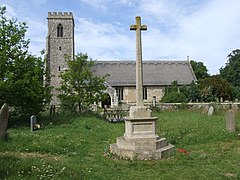Henstead with Hulver Street
| Henstead | |
|---|---|
 Henstead, Church of St Mary |
|
|
Henstead shown within Suffolk
|
|
| Population | 408 (2011 Census) |
| OS grid reference | TM495860 |
| District | |
| Shire county | |
| Region | |
| Country | England |
| Sovereign state | United Kingdom |
| Post town | Beccles |
| Postcode district | NR34 |
| Dialling code | 01502 |
| EU Parliament | East of England |
| UK Parliament | |
Henstead is a village near Kessingland and the A12 in the civil parish of Henstead with Hulver Street, in the county of Suffolk, England. It has a church called Church of St Mary which is a Grade I listed building. It has very few housing areas, and is a rural area. It is situated near Rushmere and includes its population.
It has a very small population of just 408, and is in the district of Waveney, which contains many very similar sized civil parishes.
The Independent preparatory school The Old School Henstead is also located in the village.
The church has a Norman doorway, and an embattled tower. The village stands 3 miles from the coast, and 5 SE of Beccles railway station.
In 1771 the landscape artist, Thomas Hearne spent six weeks with the young George Beaumont in Henstead at the home of the latter's tutor at Eton, Charles Davy (a priest). For Beaumont it proved the inspiration for his future profession as a landscape painter himself.
Through time, Henstead has had a history of having job opportunities mainly in agriculture, retail and handicraft.
In 1831, out of a total of 144 people, 107 worked in agriculture, 20 worked in retail and handicraft, and 17 worked in other domains.
The structure of jobs in Henstead hasn't changed, it is still a rural area, with most jobs available in the agricultural domain., for example in 1881, around 130 jobs were in the agricultural domain, the highest of all sectors. This is a description from the 1870s:
The parish contains also the hamlet of Hulver, which has a post office under Beccles. Acres, 1, 918. Real property, £2, 090. Pop., 534. Houses, 120.
Henstead has had a history of a poor social structure:
In 1831, 134 people lived in Henstead and 106 of those were labourers or servants. There were very few occupations that offered high wages, most were in the Primary industry.
...
Wikipedia

